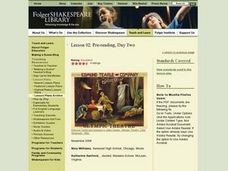Curated OER
"Monsters Are Due on Maple Street" by Rod Serling
These questions ask learners to think about the text "Monsters Are Due on Maple Street" in a variety of ways. In addition to practicing reading comprehension, class members work on interpreting, making inferences and connections,...
Curated OER
Book Discussions in a Reading Partnership
Do you have a lot of different reading levels in your class? Pair kids up by level and have them choose a book to read independently. They will make predictions, ask questions, make connections, etc. Consider creating a general reading...
Curated OER
Reading Comprehension 2: Level 10
Are you a friggatriskaidekaphobic? An excerpt from an article about the fear of Friday the 13th is used as the basis of a reading comprehension exercise. The five questions require readers to employ several strategies (drawing...
Curated OER
Reading Comprehension 4: Level 7
Make an impression with a reading comprehension assessment based on Claude Monet. After reading a short biographical paragraph about the famous French painter, readers demonstrate their comprehension skills by drawing inferences,...
CPALMS
Analyzing Vonnegut's View of the Future and His Commentary on the Present in Harrison Bergeron
Kurt Vonnegut's short story "Harrison Bergeron" engages adolescents with its theme about the dangers of complete societal equality. Learners complete a graphic organizer to track literary elements in the story, as well as an inference...
Curated OER
Gus and Grandpa and the Two Wheeled Bike: comprehension skills
What a fantastic idea! Give these bookmarks to your readers to help them conquer pages 206-222 of Gus and Grandpa and the Two Wheeled Bike. They make inferences, conduct close reads, search for cause and effects, and focus...
Curated OER
The Science of Thinking
How is fixing a flat tire like reading and writing? By thinking about each activity properly - identifying the problem and purpose, gathering information, and making inferences - you can exercise your thinking skills equally. This...
Curated OER
"A Boy and a Man" from Banner in the Sky by James Ramsey Ullman
A great resource for chapter 2 of Banner in the Sky by James Ramsey Ullman, this worksheet asks learners to respond to a series of lower- and higher-level questions using complete sentences following a class discussion. Pupils are asked...
Curated OER
The True Confessions of Charlotte Doyle: Graphic Organizer
After completing the first five chapters of The True Confessions of Charlotte Doyle By Avi, use direct quotes to make inferences about how Charlotte feels about certain characters. Later, when the novel has concluded, revisit...
Curated OER
Guided Reading: Asking Questions
Here is a reading strategies lesson in which learners use post it notes to create a bulletin board. They post their new questions on the bulletin board and look back at questions they have already learned the answer to. A great idea,...
Curated OER
Shakespeare: Julius Caesar
Before your high schoolers read Julius Caesar, have them complete this thought-provoking activity! To familiarize them with some of the play's most important lines, break the class into pairs and have them create a skit around...
Curated OER
Analyzing Atmosphere: Macbeth Murder Scene and Dagger Speech
Shakespeare's Macbeth (Act II, Scenes I and II) lacks explicit details of the murder of King Duncan, yet the author creates an atmosphere that allows us to visualize the event. Readers interpret the "Dagger Speech" by writing stage...
EngageNY
Writing, Critique, and Revising: Two-Voice Poems (Chapter 14: "Las Ucas/Grapes")
Continue work on the two-piece poem that compares two characters from Esperanza Rising. Give class members a few minutes to finish their drafts. After they have a complete product, model how to critique and edit the poems with one group....
Curated OER
Sentence Completion: High-Intermediate Level
Learners can practice their reading strategies and comprehension skills with a sentence completion worksheet that comes with a detailed answer key. Whether you use the worksheet as an assessment or as a group or individual practice...
Polk Bros Foundation
I Can Infer Motive and Effects for an Action
Help your pupils determine just what makes a character or person tick by zooming in on one character or person. This graphic organizer is dedicated to analyzing one person and asks pupils to infer a personality trait, note down an action...
Curated OER
Making and Breaking the Grid
Students examine the grid in terms of a method of organization in our society as well as graphic design. In this "Making and Breaking the Grid" lesson, students design solutions to common problems and draw conclusions about patterns and...
Southern Nevada Regional Professional Development Program
Close Reading in the Classroom
Close reading is key to the analysis and interpretation of literature. A close reading of the title and the epigraph of “The Love Song of J. Alfred Prufrock” offers readers an opportunity to examine how even single words or names can...
Prestwick House
Teaching Shakespeare: Sonnet 73
It's that time of year to consider how Shakespeare selects his images and structures his Sonnet 73 to develop the meaning of the poem. Class members examine the rhyme scheme, the indented lines, the conceit, and the images used in each...
EngageNY
Mid-Unit Assessment: Close Reading of the "Spadefoot Toad"
A mid-unit assessment challenges scholars to use their close reading skills to identify the main idea and key details. After reading a brief excerpt, learners answer a series of questions—multiple-choice, short answer—complete a graphic...
Mr. Nussbaum
Abraham Lincoln Reading Comprehension—The Presidential Years (Part 4)
How do you bring a nation back together after there is civil war? Readers learn how the United States Civil War concluded with a passage focused on the latter part of Abraham Lincoln's presidency. Multiple choice questions check pupils'...
Reed Novel Studies
The Homework Machine: Novel Study
Do opposites really attract? The D Squad in The Homework Machine includes of a quad of opposites. The group, made up of a teacher's pet, a geek, a class clown, and a slacker, make use of a machine to do their homework. In response...
Reed Novel Studies
The True Blue Scouts of Sugar Man Swamp: Novel Study
Wild feral hogs and an alligator wrestler are just two interesting aspects of Kathi Appelt's novel The True Blue Scouts of Sugar Man Swamp. Using the novel study, scholars search the text for examples of the eight parts of...
Soft Schools
Onomatopoeia in Literature
Identifying onomatopoeia is one thing; making an inference about the significance of the sound is more advanced. Young poets read a literary passage and identify the examples of onomatopoeia in each before naming the...
Reed Novel Studies
A Taste of Blackberries: Novel Study
Blackberry pie, blackberry cobbler ... what other recipes use blackberries? Scholars hunt for an interesting blackberry recipe to copy and share with friends after using the novel study for A Taste of Blackberries by Doris Buchanan...























